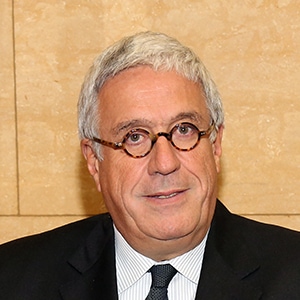Freddie Baz, general manager and board vice chair of Bank Audi, talks about his bank’s robust performance despite difficult conditions, and government efforts to restore trust.

Global Finance: How was Bank Audi’s 2018 performance?
Freddie Baz: It was a good year in terms of results. We achieved an 8% increase in assets and profits, despite the very difficult conditions in the three main countries where we operate—Lebanon, Turkey and Egypt.
In Turkey, and to a certain extent in Lebanon, we applied a derisking strategy that resulted in an overall $3 billion reduction in our loan portfolio. The board of Odea Bank, our bank in Turkey, also decided to allocate most of the pretax profit of 2018 as provisions, as a prudent policy.
In Lebanon, there was an increase in taxes: from 5% to 7% for interest on deposits and from 15% to 17% on bank profits. For us, this represented close to $100 million of incremental taxes with respect to 2017.
GF: Lebanon is the third most indebted country in the world. Could this threaten the stability of its currency?
Baz: A lot of negative reports have raised a lot of concern and resulted in some pressure. Many of these reports have a correct diagnosis of the current persisting imbalances, but Lebanon is an atypical case. The consequences that should apply don’t.
There is no mystery, just strong underlying realities. First of all, the Lebanese economy is highly dollarized. The amount of money supply in local currency is minimal, about 30% of the total. Therefore, the foreign currency reserves at the central bank tend to represent a high percentage of the money supply in local currency, providing stability for the bank’s peg policy. If you look at the Lebanese central bank’s net foreign assets over the last 10 years, they represent on average 80% of the money supply in local currency. This means the central bank can sustain the peg until the conversion of the money supply from local currency to US dollars reaches 80%—which has never happened. We had two real-life stress tests: the assassination of Prime Minister Hariri in 2005 and the Israeli war in 2006. Back then, conversion was 25% and 30% of the money supply into US dollars.
Moreover, Lebanon is a country of 5 million residents, with close to 12 million Lebanese living abroad who send recurrent flows of funds to the mother country. Those inflows represent in bad days a billion dollars a month. This goes beyond the financing needs of the Lebanese economy in both its public and its private components. There is always an excess of money coming in.
So there are buffers; but our structural imbalances are not sustainable forever, and the government can’t keep on delaying reforms.
GF: Lebanon just formed a new government. Will it be strong enough to implement reform?
Baz: For the first time, the key decision-makers are truly aware of the gravity of the situation. They know that further laxity can bring us closer to the tipping point.
There is definitely a qualitative change in the ministers’ profiles. There are some add-ons that will make a difference. For the first time we have real technocrats, very successful international lawyers, investment bankers coming from global banks and also highly talented advisers who were working in ministries and are now projected front line. This is an important added value within the context of a strong commitment to reform.
You see, markets don’t require end solutions to alleviate pressure. They need material signals that things are on the right track. If the government succeeds in sending the right signals—that there is new political governance, strong commitment to fight corruption and waste, awareness that fiscal adjustment is needed and strong commitment to quickly fight infrastructure bottlenecks and improve efficiency—then markets will show tolerance until the situation improves.



